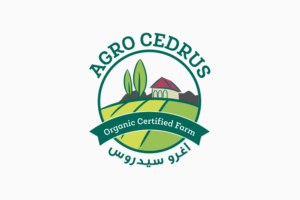Agro Cedrus is a company promoting organic crop farming, in a thirty hectares farm in Menjez Akkar. The company thrives in adopting good agriculture practices and orients its activities towards a circular economy approach.
Its focus is on exporting organic fresh fruits and vegetables to the GCC and Europe through local exporters or directly by tying up with big retail chains abroad. The farm produces fresh vegetables grown in green houses as well as in open fields. Also a considerable part of the land has been dedicated for fruitful trees such as olive, carob, pomegranate, almond, fig, and pine.
Agro Cedrus owns a factory for producing Organic Carob Molasses, one of a few factories in Lebanon with organic specifications, serving all farmers in the Akkar governorate. Also, upon request, they produce an assortment of packed and processed food such as olive oil, pickles, tomato paste, and honey. Their plan is to increase the beehives to reach three hundred through organic multiplication.
Furthermore, a packaging house has been built on the farm to facilitate packaging for their customer instantaneously upon crop cultivation, an additional service to help reduce the cost and deliver an advantage to the value chain.
DID YOU KNOW?
The organic industry is still in its early stages in Lebanon, which makes this a niche market appealing for opportunities. Very few farmers or manufacturers have taken the challenge of adopting an organic approach in their business. Developing organic products for the export market is facilitated by the international trend towards healthy food and the increasing support from TSOs & CBOs such as CBI, CBCMed, Agritech, etc.
Agro Cedrus saw these facts and is ready to help towards promoting innovation in the Agro-food industry by providing demo plots for testing or putting the production facility at QOOT’s disposal.
WHAT’S THE INNOVATION?
Our innovation is two-fold, based on one imperative: any developed innovation has to carry the characteristic of being organically raised or produced.
The first innovation is focusing on elevating the utilization of carob far beyond the traditional molasses extraction by producing carob flour satisfying different needs (low sugar, gluten intolerance, etc.) or as an organic healthy sweetener. Healthy spreads are another product under development with different characteristics serving different needs. As a specialized carob Agro processing facility, they are developing an emulsifier extracted from carob seeds. Further, a “Locust Bean Gum” is under development also from carob seeds that has proven effective in different utilizations such as reducing reflux in infants when added to formula and the possibility to improve blood fat and blood sugar levels.
The second innovation focuses on the endemic plants for aromatic and medicinal purposes. For that, they have approached the Faculty of Sciences in USJ to collaborate, knowing the faculty has developed a seeds’ bank that can be of tremendous support to develop this project.
WHAT’S THE STORY BEHIND THE INNOVATION?
While living in France back in the 90s, George Youssef – Founder of Agro Cedrus SARL, discovered the trend is towards organic and healthy food consumption. When he came back to Lebanon, he decided to go back to his village and acquire his ancestors’ land where he started planting it with fruitful trees that require less maintenance and can have great value in terms of production and nutritional facts, the carob tree. While raising fresh vegetables’ crops was one of the revenue streams, he kept on investing in the idea of carob. He built a production facility and cost shared with a USAID program for equipping the factory. This production and business model kept George’s family attached to the land and allowed him to think more about how he can innovate taking into consideration the assets they have.
In Lebanon, all carob growers have adopted the same traditional model of molasses extraction. Although their setup, being certified organic, provides an advantage in the value chain, yet the organic concept is still not mature enough in the market. At the same time, carob molasses does not make a part of the foreign culinary culture, especially Europe. Nevertheless, using the carob fruit to produce flour, sweetener and other derivatives seems to be a market requirement in Europe and the USA.
Menjez’s soil is a volcanic basaltic one, providing good natural resources and minerals for endemic plants. Essential oil, aromatic and medicinal plants are a niche market that hasn’t been tackled by the Lebanese industry yet. Based on these facts, they decided to tackle this niche production model.
WHY IS IT IMPORTANT?
First and foremost, none of the Lebanese growers have adopted this approach of value generation. Most of them are seeking for the low hanging fruits, which would make the competition even tougher had Agro Cedrus decided to remain on the traditional exploitation of the carob fruit. Furthermore, developing the essential oil business, identifying the endemic medicinal and aromatic plants not only would answer the local market demand but would also find its way to the international markets.
WHO IS BENIFITTING?
Different stakeholders are benefitting from the innovation whether the one related to Carob or the aromatic and medicinal plants. Introducing such innovation to the farmers’ culture would help them identify new revenue streams. Further, the carob extractions will increase the value generation to the growers as much as introduce new practices in introducing healthy sweeteners and ingredients to consumers.
On another level, essential oils and medicinal / aromatic plants’ sector are untapped, neither in the local market nor at the exporting level. Introducing this innovation will help the market stakeholders adopting local produce and opens a new cross border channel.



